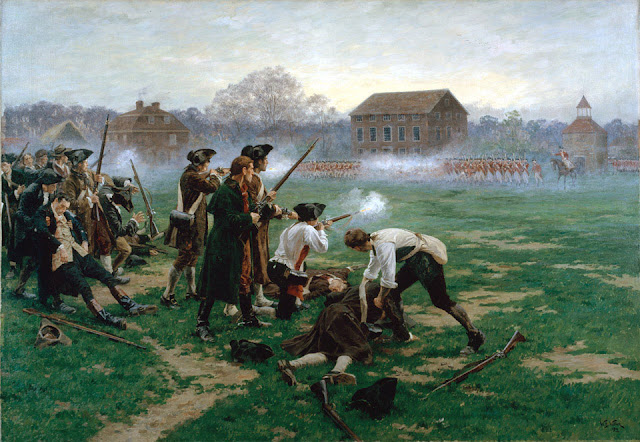April 19, 1775: Colonial miltia repel British troops at the Battles of Lexington and Concord
The previous day’s activities found a British column
marching toward the town of Concord, Massachusetts, in order to seize colonial munitions,
there. The colonists were aware of the British incursion thanks to the nocturnal
ride of Paul Revere and others. The British regulars were led by Major John Pitcairn.
His first objective was to take cannons supposedly stored in Lexington. The British
column arrived at Lexington on the morning of April 19, 1775. As the British
approached the green, militiamen swarmed out of Buckman Tavern and the surrounding
area. They formed into columns on the green, with the aid of Captain John
Parker. He told the militia to not fire unless fire upon, as they readied
themselves for battle.
The British advance halted upon the sight of the organized
militia columns. Pitcairn rode to the front of his men and ordered the colonists
to disperse. Both Parker and Pitcairn then ordered their men to hold their fire.
As the orders were being given, a shot rang out. The person who fired the shot
has been lost to history. Both sides accused the other and both claimed to have
suffered the first casualty. Some scholars believe the shot came from either
behind a tree or bush from an unknown combatant. In response, the British fired
a volley into the militia and then charged with bayonets. The colonial militia
fell back in the wake of the British onslaught.
The Lexington militiamen regrouped with other units at Concord.
The British secured most of the town, as the colonial militias secured the hills
above the town, with the narrow North Bridge at their front. The regulars
attempted to cross the bridge in almost a single file. They were met with a
cascade of fire from the militias entrenched on the hills above. The colonial
attacked forced the British to withdraw back to Lexington. However, the morning’s
events had become known to nearby residents, and they began arming themselves
and surrounding the town. The British began to be fired upon from the hills,
hollows and woods of the surrounding area. They decided to retreat back to the
safety of Boston. The colonial fire continued as the progressed toward the city.
When they finally reached Boston, they realized that they were trapped. Militias
from all over Massachusetts had converged on the city, blocking the British
from escaping.




Comments
Post a Comment